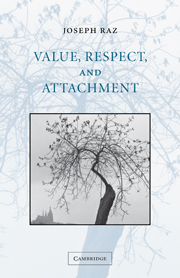1 - Attachment and uniqueness
Published online by Cambridge University Press: 04 December 2009
Summary
The crucial issue is not whether sentiments and attitudes are seen as important …, but whether – and to what extent – these sentiments and attitudes can be influenced and cultivated through reasoning.
Having left the morally worst century of human history we may on occasion seek solace by reflecting on aspects of the recent past which can count as moral advances, as pointers to a more decent future for our species. When my mind turns to such thoughts perhaps one feature stands out. I will call it the legitimation of difference. I have in mind a change in sensibility, a change in what people find obvious and what appears to them to require justification and explanation. Such changes are never universal. This one may not have gone very far yet. But I think, and hope, that there has been such a shift in the moral sensibility of many people in the West, a shift towards taking difference – in culture and religion, in gender, sexual orientation or in race – for granted, acknowledging its unquestioned legitimacy, and seeking justification only when hostility to difference is manifested, or where advantage is given to one side of such divides.
Is it evidence of that shift, or is it proof of the vitality of the Seeley lectures, that all previous lecturers devoted so much attention to diversity and disagreement and the proper response to them? For surely such shifts in sensibility breed, as well as being nourished by, shifts in theoretical reflection.
- Type
- Chapter
- Information
- Value, Respect, and Attachment , pp. 10 - 40Publisher: Cambridge University PressPrint publication year: 2001
- 1
- Cited by

